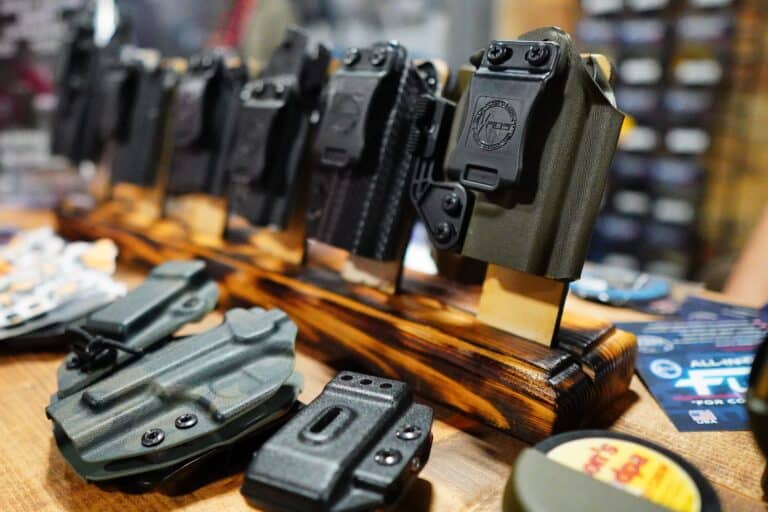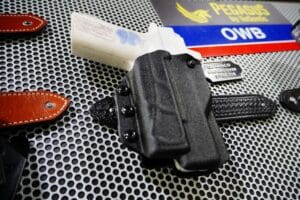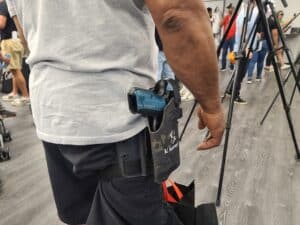The Keystone State cannot ban 18–20-year-olds from publicly carrying firearms during declared states of emergency, a federal appeals court ruled Thursday.
In a 2-1 decision, a Third Circuit Court of Appeals panel blocked Pennsylvania from enforcing a trio of state statutes that together prohibit people between the ages of 18 and 20 from legally carrying firearms when a state of emergency is declared. The majority opinion, which reversed a lower court ruling, centered around the age at which the Second Amendment’s text protects Americans.
“The words ‘the people’ in the Second Amendment presumptively encompass all adult Americans, including 18- to-20-year-olds, and we are aware of no founding-era law that supports disarming people in that age group,” Judge Kent A. Jordan wrote in Lara v. Comm’r Pa. State Police. “Accordingly, we will reverse and remand.”
The ruling adds to a growing body of federal court decisions casting doubt on age-based gun restrictions. That collection has grown in the time since the Supreme Court handed down its New York State Rifle & Pistol Association v. Bruen decision in 2022. The new ruling arrives as federal judges in Texas, Tennessee, and Minnesota have similarly ruled that adults under the age of 21 are protected by the Second Amendment and cannot be deprived of the right to carry firearms for self-defense.
The Pennsylvania suit centers around a distinction made in the state’s gun-carry laws between forms of lawful carry and how they can be abridged during emergency declarations. Pennsylvania allows all adults 18 and older who are not prohibited from owning firearms to open carry in public without a permit. Concealed carry in the state requires a permit whose issuance is limited to those 21 and older. Pennsylvania law bars the public carrying of firearms during a state or municipal emergency declaration but provides an exemption for valid permit holders. Since 18-to-20-year-olds can’t obtain permits, that leaves them without a legal option to carry under such circumstances.
A trio of young adults first sued the Pennsylvania State Police in October of 2020 when the state was under an “uninterrupted state of emergency for nearly three years” due to COVID-19, the opioid crisis, and Hurricane Ida. The Firearms Policy Coalition (FPC), which represented them, cheered the court’s decision.
“We applaud the Third Circuit’s decision in this case confirming that 18-to-20-year-old adults have the same right to armed self-defense as any other adult,” Cody J. Wisniewski, FPC’s General Counsel, said in a statement. “If it wasn’t for 18-to-20-year-old adults being empowered to exercise their right to defend themselves, their loved ones, and their communities, our Nation wouldn’t exist.”
In defense of the state’s law, the Pennsylvania State Police Commissioner argued adults under 21 were considered “infants” or “minors” around the time of the Founding. Therefore, he argued, they would not fall under the era’s understanding of “the people” as written in the Second Amendment.
Judge Jordan, a George W. Bush appointee, disagreed and said that Bruen‘s analysis does not require excluding individuals from “the people” in modern cases just because they were excluded at the Founding.
“That argument conflates Bruen’s two distinct analytical steps,” he wrote. “Although the government is tasked with identifying a historical analogue at the second step of the Bruen analysis, we are not limited to looking through that same retrospective lens at the first step. If, at step one, we were rigidly limited by eighteenth century conceptual boundaries, ‘the people’ would consist of white, landed men, and that is obviously not the state of the law.”
Instead, he argued that the Supreme Court has established a presumption that the Second Amendment protects “all Americans” and that modern legal understandings of “the people” typically include young adults for most other constitutional rights.
“It is undisputed that 18-to-20-year-olds are among ‘the people’ for other constitutional rights such as the right to vote, freedom of speech, peaceable assembly, government petitions, and the right against unreasonable government searches and seizures,” he wrote.
The commissioner also pointed to “dozens of” mid-to-late nineteenth-century laws restricting 18-to-20-year-olds’ ability to “purchase, possess and carry firearms” as possible analogues for Pennsylvania’s current legal regime.
Judge Jordan again disagreed because he said those cited examples were too far removed from the time of the Founding to shed light on the limits of the Second Amendment. Instead, he noted eighteenth-century laws supported the gun rights of young adults.
“That young adults had to serve in the militia indicates that founding-era lawmakers believed those youth could, and indeed should, keep and bear arms,” he wrote.
Judge L. Felipe Restrepo, a Barack Obama appointee, dissented from the majority. Restrepo argued that there is evidence that the Founding-era public would not have understood the text of the Second Amendment to extend its protection to those under 21 because they were considered minors without many independent legal rights, including access to courts, property, and free speech.
He said that minor status contained a “presumption that people under the age of 21 lacked sufficient cognitive and moral faculties to govern themselves” and that the use of firearms by those in that age group was the result of a privilege given to them by their parents or other authority figures.
“At the Founding, people under 21 bore arms at the pleasure of their superiors,” Judge Restrepo wrote. “Were they to find this condition violative of their rights, they would have no right to petition the courts for redress. Stated bluntly, the same generation from whom Appellants may have begged relief would not have permitted them to bring their claim.”
The Pennsylvania State Police declined a request for comment.






